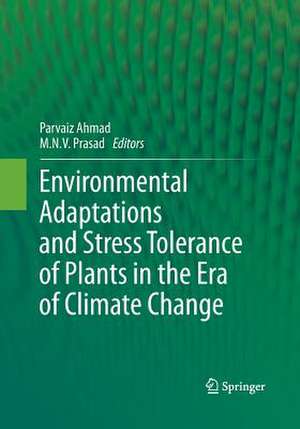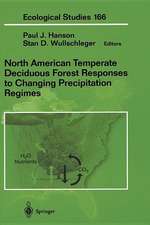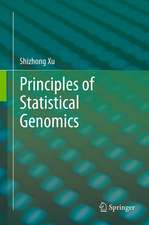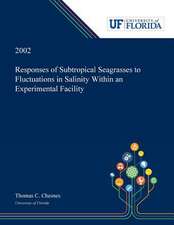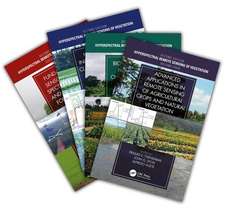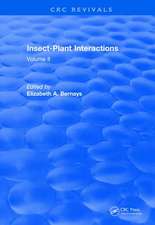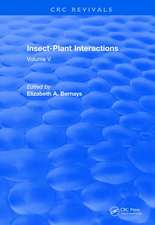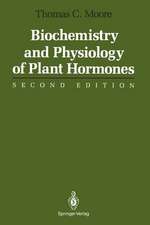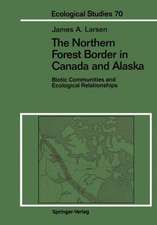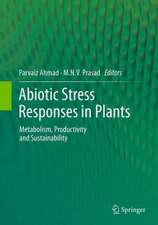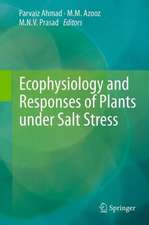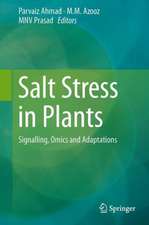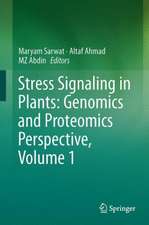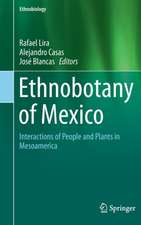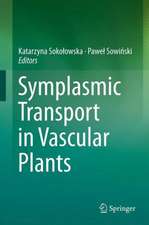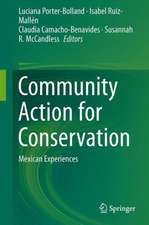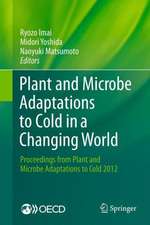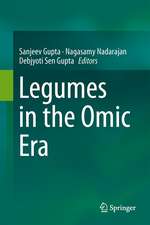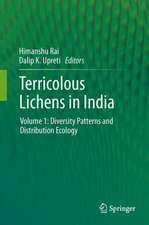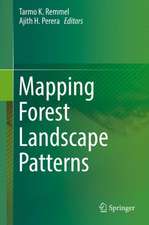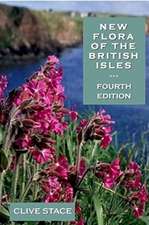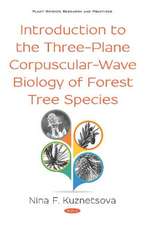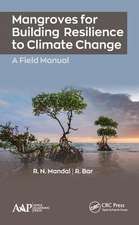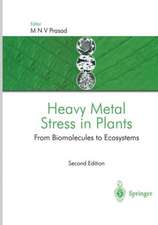Environmental Adaptations and Stress Tolerance of Plants in the Era of Climate Change
Editat de Parvaiz Ahmad, M. N. V. Prasaden Limba Engleză Paperback – 22 aug 2016
Dr. Parvaiz is Assistant professorin Botany at A.S. College, Srinagar, Jammu and Kashmir, India. He has completed his post-graduation in Botany in 2000 from Jamia Hamdard New Delhi India. After his Ph.D from the Indian Institute of Technology (IIT) Delhi, India in 2007 he joined the International Centre for Genetic Engineering and Biotechnology, New Delhi. He has published more than 20 research papers in peer reviewed journals and 4 book chapters. He has also edited a volume which is in press with Studium Press Pvt. India Ltd., New Delhi, India. Dr. Parvaiz is actively engaged in studying the molecular and physio-biochemical responses of different plants (mulberry, pea, Indian mustard) under environmental stress.
Prof. M.N.V. Prasad is a Professor in the Department of Plant Sciences at the University of Hyderabad, India. He received B.Sc. (1973) and M.Sc. (1975) degrees from Andhra University, India, and the Ph.D. degree (1979) in botany from the University of Lucknow, India. Prasad had published 216 articles in peer reviewed journals and 82 book chapters and conference proceedings in the broad area of environmental botany and heavy metal stress in plants. He is the author, co-author, editor, or co-editor for eight books. He is the recipient of Pitamber Pant national Environment Fellowship of 2007 awarded by the Ministry of Environment and Forests, Government of India.
| Toate formatele și edițiile | Preț | Express |
|---|---|---|
| Paperback (1) | 1234.00 lei 43-57 zile | |
| Springer – 22 aug 2016 | 1234.00 lei 43-57 zile | |
| Hardback (1) | 1241.10 lei 43-57 zile | |
| Springer – 15 noi 2011 | 1241.10 lei 43-57 zile |
Preț: 1234.00 lei
Preț vechi: 1504.88 lei
-18% Nou
Puncte Express: 1851
Preț estimativ în valută:
236.13€ • 247.16$ • 196.53£
236.13€ • 247.16$ • 196.53£
Carte tipărită la comandă
Livrare economică 31 martie-14 aprilie
Preluare comenzi: 021 569.72.76
Specificații
ISBN-13: 9781493941254
ISBN-10: 1493941259
Pagini: 515
Ilustrații: XVI, 515 p. 85 illus., 40 illus. in color.
Dimensiuni: 178 x 254 mm
Greutate: 0.91 kg
Ediția:Softcover reprint of the original 1st ed. 2012
Editura: Springer
Colecția Springer
Locul publicării:New York, NY, United States
ISBN-10: 1493941259
Pagini: 515
Ilustrații: XVI, 515 p. 85 illus., 40 illus. in color.
Dimensiuni: 178 x 254 mm
Greutate: 0.91 kg
Ediția:Softcover reprint of the original 1st ed. 2012
Editura: Springer
Colecția Springer
Locul publicării:New York, NY, United States
Cuprins
Abiotic stress responses in plants: an Overview.- Prospects of halophytes in understanding and managing abiotic stress tolerance.- UV-B Radiation, its Effects and Defense Mechanisms in Terrestrial Plants.- K+ nutrition, K+ uptake and its role in environmental stress in plants.- Temperature Stress and Responses of Plants.- Responses and Management of Heat Stress in Plants.- Understanding Chilling Tolerance Traits Using Arabidopsis Chilling-Sensitive Mutants.- Root Form and Function in Plant as an Adaptation to Changing Climate.- Reactive Oxygen Species and Nitric Oxide in Plants under Cadmium Stress: From Toxicity to Signaling.- Reactive Nitrogen Inflows and Nitrogen use Efficiency in Agriculture: An Environment Perspective.- Arbuscular Mycorrhizal Symbiosis and Other Plant-Soil Interactions in Relation to Environmental Stress.- MicroRNAs and their Role in Plants during Abiotic Stresses.- Transcription Factors Involved in Environmental Stress Responses in Plants.- Plant Signaling UnderAbiotic Stress Environment.- Calcium Signalling in Plant Cells Under Environmental Stress.- Role of H2O2 as Signalling Molecule in Plants.- Role of Phytohormone Signaling During Stress.- Ethylene and Abiotic Stress Tolerance in Plants.- New Approaches to Study Metal-Induced Stress in Plants.- Sulfur in the alleviation of cadmium-induced oxidative stress in plants.- Role of Salicylic acid in Alleviating Heavy Metal Stress.- Bioremediation and mitigation of organic contaminants in the era of climate changes.- Exploitation of Weeds and Ornamentals for Bioremediation of Metalliferous Substrates in the Era of Climate Change.
Textul de pe ultima copertă
Climate change is a complex phenomenon with a wide range of impacts on the environment. Biotic and abiotic stress are a result of climate change. Abiotic stress is caused by primary and secondary stresses which are an impediment to plant productivity. Prolonged exposure to these stresses results in altered metabolism and damage to biomolecules. Plants evolve defense mechanisms to withstand these stresses, e.g. synthesis of osmolytes, osmoprotectants, and antioxidants. Stress responsive genes and gene products including expressed proteins are implicated in conferring tolerance to the plant. This volume will provide the reader with a wide spectrum of information, including vital references. It also provides information as to how phytoconstituents, hormones and plant associated microbes help the plants to tolerate the stress. This volume also highlights the use of plant resources for ameliorating soil contaminants such as heavy metals.
Dr. Parvaiz is Assistant professorin Botany at A.S. College, Srinagar, Jammu and Kashmir, India. He has completed his post-graduation in Botany in 2000 from Jamia Hamdard New Delhi India. After his Ph.D from the Indian Institute of Technology (IIT) Delhi, India in 2007 he joined the International Centre for Genetic Engineering and Biotechnology, New Delhi. He has published more than 20 research papers in peer reviewed journals and 4 book chapters. He has also edited a volume which is in press with Studium Press Pvt. India Ltd., New Delhi, India. Dr. Parvaiz is actively engaged in studying the molecular and physio-biochemical responses of different plants (mulberry, pea, Indian mustard) under environmental stress.
Prof. M.N.V. Prasad is a Professor in the Department of Plant Sciences at the University of Hyderabad, India. He received B.Sc. (1973) and M.Sc. (1975) degrees from Andhra University, India, and the Ph.D. degree (1979) in botany from the University of Lucknow, India. Prasad had published 216 articles in peer reviewed journals and 82 book chapters and conference proceedings in the broad area of environmental botany and heavy metal stress in plants. He is the author, co-author, editor, or co-editor for eight books. He is the recipient of Pitamber Pant national Environment Fellowship of 2007 awarded by the Ministry of Environment and Forests, Government of India.
Dr. Parvaiz is Assistant professorin Botany at A.S. College, Srinagar, Jammu and Kashmir, India. He has completed his post-graduation in Botany in 2000 from Jamia Hamdard New Delhi India. After his Ph.D from the Indian Institute of Technology (IIT) Delhi, India in 2007 he joined the International Centre for Genetic Engineering and Biotechnology, New Delhi. He has published more than 20 research papers in peer reviewed journals and 4 book chapters. He has also edited a volume which is in press with Studium Press Pvt. India Ltd., New Delhi, India. Dr. Parvaiz is actively engaged in studying the molecular and physio-biochemical responses of different plants (mulberry, pea, Indian mustard) under environmental stress.
Prof. M.N.V. Prasad is a Professor in the Department of Plant Sciences at the University of Hyderabad, India. He received B.Sc. (1973) and M.Sc. (1975) degrees from Andhra University, India, and the Ph.D. degree (1979) in botany from the University of Lucknow, India. Prasad had published 216 articles in peer reviewed journals and 82 book chapters and conference proceedings in the broad area of environmental botany and heavy metal stress in plants. He is the author, co-author, editor, or co-editor for eight books. He is the recipient of Pitamber Pant national Environment Fellowship of 2007 awarded by the Ministry of Environment and Forests, Government of India.
Caracteristici
One of the most comprehensive studies on plant adaptation during abiotic stress Covers special topics on plant signaling during stress Numerous visual material, including over 100 figures and tables Includes supplementary material: sn.pub/extras
